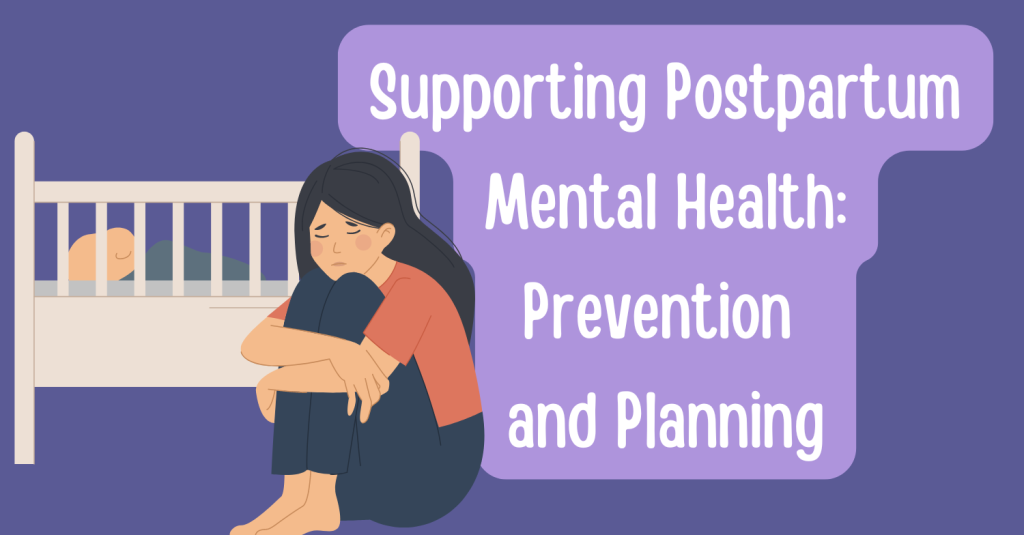As you prepare to welcome your little one into the world, there are countless things to think about—nursery decorations, prenatal vitamins, and birthing plans, to name just a few. However, one crucial area that often gets overlooked in the whirlwind of preparation is postpartum mental health—not just for you, the birthing woman, but also for your partner. Ensuring you are emotionally and mentally prepared for the transition into parenthood is vital for both of you.
Understanding Postpartum Mental Health: PPD, PPA, and Psychosis
You’ve likely heard of Postpartum Depression (PPD), which affects approximately 10-15% of birthing women, but it can also affect partners. PPD is not just about feeling sad; it can present as persistent feelings of hopelessness, lack of motivation, deep fatigue, and difficulty bonding with your baby. Then there is Postpartum Anxiety (PPA), which manifests as constant worry, panic attacks, and a relentless sense of dread or fear. Often, PPD and PPA are intertwined, creating a cycle that can make the postpartum period overwhelming and exhausting.
Postpartum Psychosis is rarer but can be life-threatening, with symptoms including hallucinations, paranoia, confusion, and extreme mood swings. It’s vital to recognize these symptoms early on to ensure safety and timely intervention for both you and your partner.
The Warning Signs:
Understanding the warning signs of postpartum mental health issues is essential for you and your partner to recognize when to seek help.
Remember, it’s completely normal to have a range of emotions after giving birth, —excitement, joy, fear, and even overwhelm. However, if these feelings become persistent or start to interfere with your daily life and ability to care for yourself or your baby, it’s important to seek help.
Here are some common symptoms of Postpartum Depression (PPD), Postpartum Anxiety (PPA), and Postpartum Psychosis that you should be aware of:
Warning Signs of Postpartum Depression (PPD):
- Persistent Sadness or Mood Swings: Feeling down, hopeless, or crying more often than usual.
- Lack of Interest or Pleasure: Losing interest in activities you used to enjoy, including bonding with your baby or spending time with loved ones.
- Changes in Appetite or Sleep Patterns: Experiencing insomnia or excessive sleeping, or noticeable changes in appetite, such as overeating or loss of appetite.
- Overwhelming Fatigue: Feeling excessively tired or lethargic, even after resting.
- Difficulty Concentrating: Trouble focusing, making decisions, or remembering details.
- Feelings of Guilt or Worthlessness: Experiencing persistent negative thoughts about yourself or your ability to parent.
- Withdrawing from Loved Ones: Isolating yourself from friends, family, or your partner.
- Thoughts of Harming Yourself or Your Baby: Experiencing thoughts of self-harm or harming your baby. If this occurs, seek immediate medical attention.
Warning Signs of Postpartum Anxiety (PPA):
- Constant Worry: Feeling overwhelmed by fear or worry, especially about your baby’s health or well-being.
- Racing Thoughts: Unable to quiet your mind or stop worrying, even when there is no specific reason.
- Physical Symptoms of Anxiety: Experiencing symptoms such as rapid heartbeat, shortness of breath, dizziness, or nausea.
- Panic Attacks: Sudden and intense episodes of fear, accompanied by physical symptoms like sweating, trembling, or chest pain.
- Restlessness or Irritability: Feeling constantly on edge, irritable, or unable to relax.
- Compulsive Behaviors: Repetitively checking on the baby, excessively cleaning, or performing other rituals out of fear or worry.
Warning Signs of Postpartum Psychosis:
- Severe Confusion and Disorientation: Difficulty understanding where you are or what is happening around you.
- Delusions or Hallucinations: Experiencing thoughts or beliefs that are not based in reality, or seeing or hearing things that others do not.
- Paranoia: Feeling excessively suspicious or fearful that others intend to harm you or your baby.
- Rapid Mood Swings: Experiencing extreme highs and lows in mood within a short period.
- Agitation and Restlessness: Feeling restless, agitated, or unable to sit still.
- Risk of Harm: Thoughts or behaviors that pose a danger to yourself, your baby, or others. This is a medical emergency and requires immediate intervention.
Remember- These issues can affect partners too!
The Crucial First Step -Address Existing Anxiety and Depression
If you or your partner already experience symptoms of anxiety or depression, now is the time to address them. Research shows that existing mental health conditions can worsen during the postpartum period. Your emotional state doesn’t exist in isolation—it’s deeply interconnected with your body’s physiological state. The transition to parenthood brings profound changes, both physically and emotionally. Preparing your mental landscape before your baby arrives is not just an option; it’s a necessity.
This is where BodyTalk can play a transformative role. As a BodyTalk practitioner, I help my clients tap into their body’s innate wisdom to identify and release the underlying factors contributing to their anxiety or depression. This isn’t about masking symptoms—it’s about bringing awareness and healing to the deep-rooted issues that may be affecting you, often on a subconscious level.
BodyTalk helps you reconnect with yourself, rewire old patterns, and release emotional blocks. By addressing these before your baby arrives, you can set the stage for a more balanced and peaceful postpartum experience.
The Importance of Postpartum Planning
Now, let’s talk about postpartum planning—a step so often overlooked, yet it is vital. Imagine postpartum planning as a map guiding you through an unknown terrain. Even the most experienced travelers use maps, right? A postpartum plan allows you to proactively consider what support you may need, how to communicate your needs, and how to anticipate potential challenges.
I’ve created a comprehensive and customizable Postpartum Planner for my clients to set the stage for a smoother postpartum journey. This tool guides you through creating a tailored plan, considering your unique needs and desires. It helps you think through everything from practical details like meal prep and visitors to emotional support systems, managing older children and self-care practices. This planner is designed to be more than just a checklist; it’s an interactive and holistic guide to help you feel prepared and empowered.
How BodyTalk and Customized Planning Can Help if Issues Arise
Even with the best planning, the postpartum period can be unpredictable. You may have a baby in the NICU or other unforeseen challenge. Your body, mind, and spirit undergo significant shifts, and it’s normal to feel overwhelmed at times. If you or your partner start to experience symptoms of PPD, PPA, or other mental health challenges, BodyTalk can be an invaluable tool.
BodyTalk addresses these issues at their core by working with your body’s energy systems to balance hormones, alleviate stress, and clear emotional blockages. Sessions can help to rebalance the body’s communication pathways, promote a sense of calm, and support you in processing any emotions that may arise.
Furthermore, the custom postpartum planner we create together will help you establish a solid support network and self-care practices tailored to your unique situation. It’s not just about surviving the postpartum period; it’s about thriving. By consciously preparing for the emotional and mental shifts that come with parenthood, you can step into this new chapter feeling empowered, supported, and ready to embrace all the joys (and challenges) of parenthood.
Why Start Now?
If you’re pregnant or planning to be, there’s no better time to start preparing for your postpartum journey. Whether you have a history of mental health challenges or not, having a robust plan and the right support can make all the difference.
By working with me, you’ll have access to the tools and resources needed to navigate this period with confidence. Together, we’ll create a custom postpartum plan tailored to you and your partner’s needs and use BodyTalk to address any underlying emotional or physical concerns before they become bigger issues.
Remember, the postpartum period is a time of incredible transformation. Let’s make sure you and your partner have all the support, resources, and tools you need to navigate it with grace, ease, and joy.
Feel free to reach out to schedule a session or discuss how we can work together to create a nurturing and supportive plan for you and your family. Let’s set the foundation for a beautiful postpartum journey—together.
I’m Joanne Fisher, BodyTalk Birthkeeper and I’m here to help.

